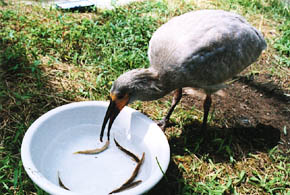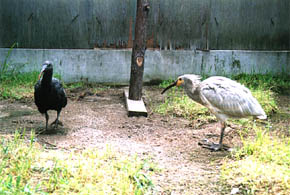|
MONTHLY NEWS July 1999 Schoolchildren Name Newborn Ibis "Yu Yu" |
 The
first crested ibis to be bred under human care was named "Yu Yu" in early
July after hatching on May 21 from an egg born to a pair of ibises donated
by China. The chick now being grown at the Toki (crested ibis) Preservation Center on the island of Sado in Niigata Prefecture, weighs over 1.2 kilograms and is capable of eating without assistance. The
first crested ibis to be bred under human care was named "Yu Yu" in early
July after hatching on May 21 from an egg born to a pair of ibises donated
by China. The chick now being grown at the Toki (crested ibis) Preservation Center on the island of Sado in Niigata Prefecture, weighs over 1.2 kilograms and is capable of eating without assistance. The chick weighed only 55 grams at birth but has been fed six times daily for over a month. In the beginning, it was fed a mixture of small fish and milk. The fish were transported from China by air. The Environment Agency asked primary schoolchildren across the country to send in suggestions for the name of the newborn chick, and received 11,859 entries by mid-June. Many of the suggestions were sent by groups, including schools, along with an explanation of why they chose the names. Some schools researched the history of efforts to preserve and breed the crested ibis, which is now essentially extinct in Japan. One class composed a song entitled the "Song of Crested Ibis" and sent the Environment Agency a recording of it on a cassette tape. One child wrote, "At first I thought people were making too much fuss over just one bird, but as I continued my research, I realized that the birth of the crested ibis was the result of a very long and strenuous effort." Niibo and Gyoya Elementary Schools, both located near the ibis center on Sado Island, held a meeting to come up with a joint suggestion. For many years, the schools have been carrying out a range of activities to promote schoolchildren's awareness of the importance of protecting the ibis. A former principal at the Niibo Elementary School composed a song about the bird, and schoolchildren there now dance to it each year on field day. The Gyoya Elementary School, meanwhile, began a fund-raising campaign recently to support the efforts to breed ibises on the island.  The name "Yu Yu," chosen in early
July, consists of two identical Chinese characters that can mean "gentle"
or "exceptional." It was the most popular entry, being turned in by 164
groups, and was selected from a short list of seven nominees. The name "Yu Yu," chosen in early
July, consists of two identical Chinese characters that can mean "gentle"
or "exceptional." It was the most popular entry, being turned in by 164
groups, and was selected from a short list of seven nominees. The agency will send certificates to the groups that came up with the name, including six elementary schools on Sado and a Japanese school in Shanghai, China. Ibises had nearly disappeared from the wild in Japan by the early 1980s due to overhunting and the destruction of their habitats. Today, wild ibises are extinct in Japan, and there is only one Japanese crested ibis alive under human protection--a 32 year old bird kept at the ibis preservation center. A number of failed attempts to breed ibises were made between 1985 and 1995. In January this year, Yang Yang and Yo Yo, three-year-old female and male ibises from China's Shaanxi Province, arrived at the center. The birds were a gift that Chinese President Jiang Zemin promised to Emperor Akihito during the former's visit to Japan in November 1998. The Environment Agency plans to start creating an environment hospitable to crested ibises in order to fulfill its ultimate objective of returning the birds to the wild, which many experts believe will take at least another several decades.
Photo: Yu Yu feads on fish imported from China (top)
and plays with a dark feathered friend at the preservation center. (Environment
Agency) |
.

|